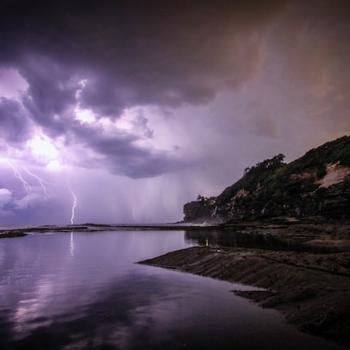Editors' Note: This article is part of the Patheos Public Square on the Future of Faith in America: Progressive Christianity. Read other perspectives here.
In stealing my title from Paul Tillich, I do not mean to say that I foresee any convulsive theological tremors on the horizon in respect to American religion. We've been there and done that, especially back in Tillich's own era. I'm being much more literal: What I mean to say is that I believe that geophysical upheavals and disruptions will intensify over the next few years to the point that Americans' core religious and ethical values are put to the ultimate test. Let me also say, right up front, that I am not particularly hopeful in regard to the likely outcome.
Here is a portent: I recently caught a TV news interview with Californian Governor Jerry Brown. Brown has been promoting his very aggressive green energy plan. The interviewer asked the 75-year-old leader if his obvious passion for fighting climate change and mitigating its worst effects has anything to do with his youthful seminary training with the Jesuits. Brown did not hesitate to say that yes, he feels an obvious connection in that attacks on earth, water, and air are attacks on the "fundamentals" for human thriving. He referred to earth, water, and air as "eternal verities" in the same reverential sense that he was taught to revere Father, Son, and Holy Spirit as a youth.
In my view Brown has made the breakthrough that many other religiously-grounded Americans will be making or be failing to make over the next couple of decades. He has rediscovered his religious zeal and his hunger and thirst for justice in the face of imminent environmental catastrophe. And "catastrophe" is not too strong a word, because climate change is clearly accelerating with alarming and predictable results. Weather cycles are becoming much more severe, wildfires and landslides becoming much more common as the West heats up. Water tables everywhere in drought-stricken regions are falling alarmingly. Crop failures, whether from drought, flood, or the ravages of invasive species, threaten the food supply. And here I refer only to impacts within the United States. The effects of rapid climate change in other parts of the word — the poorer parts in particular — are becoming and will become far more nightmarish, causing huge population migrations, mass starvation, and the rampant spread of lethal diseases.
Everyone knows about — and politicians exploit — the frog-in-the-pot aspect of climate change: the fact that, until now at least, it has proceeded incrementally and almost imperceptibly. The ethical challenge we face is finding the capacity to act decisively now, based on the horrific outcomes that all reputable science tells us are certain to come about even if we could stop all further atmospheric carbon build-up this very day (which we cannot).
Unfortunately, almost all forms and flavors of American religion have been partly anesthetized under the blanket of American prosperity, American consumerism, and American exceptionalism (the idea that, somehow, this country is divinely favored forever to escape the fate of others). As sheep to the slaughter, the great majority of the faithful have also resigned themselves to corporate domination of our politics and our common culture. As well, a very significant part of American religion — the part we associate with conservative Protestantism — still teaches that we need not worry too much about the fate of the earth, insofar as this earth is not our real home. (It's hard to miss the bitter irony of the fact that so much apocalyptic religion seems oblivious to the actual apocalypse — the environmental apocalypse — unfolding right in front of us.)
In our American context, I believe that seriously coming to grips with the climate crisis amounts to the equivalent of a conversion experience: to having the scales fall from one's eyes, as it were, breaking out of the consumerist bubble, and repenting of the sins and follies one committed unthinkingly while still living inside of it. This conversion experience is similar in some ways to the conversion experience white people need to undergo in regard to ongoing toxic reality of white privilege and white racism and immense suffering that we who are white have inflicted on African Americans for nearly four hundred years upon this continent. Just as relatively few whites have actually undergone this essential conversion (witness the ignorant white "All Lives Matter" response to the #BlackLivesMatter movement), so too I fear that relatively few religious Americans will awaken to the climate crisis until its worst effects begin to sweep over us.




